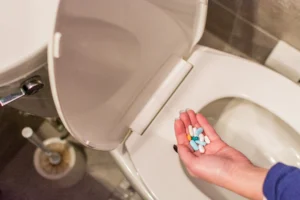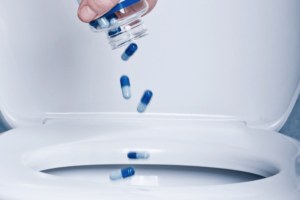Ever stumbled upon an old medicine cabinet filled with expired or unused pills and wondered if you can flush pills down the toilet? It's a question many of us have asked, assuming it's a quick fix to dispose of unwelcome pharmaceuticals. However, this seemingly simple act can have profound implications for both environmental and health safety.
This article dives into the reasons why you shouldn't flush pills down the toilet, unraveling the hidden risks and offering you safer alternatives for disposal. Prepare to be enlightened about a subject you might have never given much thought to before!
Why Shouldn't You Flush Pills Down the Toilet? Understanding the Basics
 It seems simple, right? Expired or unused medications cluttering your shelves meet a swift end with a flush. However, this common question – can you flush pills down the toilet – has a crucial answer: it's a definite no. Flushing medications poses significant environmental hazards. Wastewater treatment facilities aren't designed to remove pharmaceutical compounds.
It seems simple, right? Expired or unused medications cluttering your shelves meet a swift end with a flush. However, this common question – can you flush pills down the toilet – has a crucial answer: it's a definite no. Flushing medications poses significant environmental hazards. Wastewater treatment facilities aren't designed to remove pharmaceutical compounds.
Consequently, these substances can pass through the system and enter our rivers, lakes, and eventually, the drinking water supply. Even in minimal concentrations, the presence of these chemicals in natural water bodies can disrupt aquatic ecosystems and potentially impact human health.
In essence, what seems like a convenient disposal method is, in reality, an environmental faux pas. It's paramount to understand the broad repercussions of such actions on our planet's health and our own.
The Environmental Impact: Why Not Flush Pills Down the Toilet
Diving deeper into the why not flush pills down the toilet conversation, consider the wider environmental consequences.
- When medications are flushed, they enter waterways, often remaining intact.
- Pharmaceuticals are crafted to be stable and effective, which means they don't easily break down.
- This stability leads to active ingredients persisting in the environment.
Research highlights that common drugs like antibiotics and hormones have been detected in bodies of water worldwide, affecting the reproductive health of fish and other aquatic organisms. These compounds can induce resistance in bacteria and disrupt ecosystems. The sheer volume of medications consumed globally means even individual actions contribute to this problem. Recognizing the link between flushing pills and environmental degradation is essential for fostering more sustainable practices.
Don't Flush Pills Down the Toilet: Risks to Aquatic Life
 Echoing the significant sentiment, don't flush pills down the toilet, let's zone in specifically on aquatic life.
Echoing the significant sentiment, don't flush pills down the toilet, let's zone in specifically on aquatic life.
This issue extends beyond pollution; it’s about preserving the delicate balance of our aquatic ecosystems. Medications like antidepressants, painkillers, and birth control pills have been found at trace levels in bodies of water, introducing foreign chemicals into aquatic environments.
These substances can alter fish behaviors, endangering their survival by making them more prone to predators. More insidiously, some chemicals mimic hormones, potentially leading to genetic alterations in future generations of wildlife. The knock-on effects could devastate biodiversity and ecosystem functionality. As stewards of the environment, recognizing our shared responsibility to protect these vital habitats is paramount. The message is clear: safeguarding aquatic life begins with how we dispose of our unwanted medications.
Human Health at Stake: The Dangers of Flushing Pills
Addressing the question, why should you not flush pills down the toilet? shifts the focus to human health impacts. The contaminants originating from flushed medications don't always stay isolated in the aquatic world; they can circle back to us. Trace pharmaceuticals in drinking water present a growing concern.
Although these concentrations are typically low, the long-term implications of exposure to a cocktail of pharmaceuticals are not fully understood. There's potential for drug-resistant bacteria to flourish and the subtle influences on human biology, including hormone disruption, are alarming possibilities. The precautionary principle suggests minimizing exposure where the full risks are unknown, emphasizing the importance of proper medication disposal as a public health priority.
Alternatives to the Flush: How to Dispose of Pills Properly
Understanding the risks invites the question: how can one dispose of pills properly if not by flushing? Fortunately, there are safer alternatives.
 Many pharmacies offer take-back programs, allowing you to return unused or expired medications for safe disposal. Additionally, the Drug Enforcement Administration (DEA) occasionally hosts National Prescription Drug Take-Back Days, providing a no-questions-asked method to dispose of medications responsibly.
Many pharmacies offer take-back programs, allowing you to return unused or expired medications for safe disposal. Additionally, the Drug Enforcement Administration (DEA) occasionally hosts National Prescription Drug Take-Back Days, providing a no-questions-asked method to dispose of medications responsibly.
If these options are unavailable, mixing pills with unpalatable substances like cat litter or coffee grounds, sealing them in a plastic bag, and throwing them in the trash minimizes the chances of environmental contamination and human ingestion. Always remember to remove any personal information from prescription labels to protect your privacy.
Community Initiatives and Official Recommendations for Pharmaceutical Disposal
Engaging with community initiatives and adhering to official recommendations fortifies our collective approach to safer pharmaceutical disposal.
Several communities have established permanent collection sites, fostering a culture of environmental stewardship and responsible medication management. These sites, often found in local pharmacies, police stations, or city halls, provide secure bins for collecting pharmaceutical waste.
Official guidelines also stress the importance of educating the public on the hazards of improper disposal methods. Awareness campaigns and educational programs can empower individuals with knowledge, encouraging responsible behaviors. By participating in these initiatives and following best practices for drug disposal, we contribute to a healthier planet and a safer future for all inhabitants.
